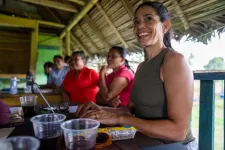(Press-News.org) LOS ANGELES – June 3, 2024 – For the last three decades, breakthroughs have been sparse for soft tissue sarcomas, which are rare cancers that affect muscles, fat and other connective tissues. Today, a global team of researchers funded by a Stand Up To Cancer® (SU2C) grant announced clinical trial results that point to a new immunotherapy treatment option for two of the most common types of soft tissue sarcoma in adults, a breakthrough that reduces the risk of relapse by 43% at two years and will likely impact clinical practice for these cancer types.
The research was presented today at the 2024 American Society of Clinical Oncology Annual Meeting.
The clinical trial, which was run by a SU2C Catalyst® Research Team, was supported by Merck’s (known as MSD outside of the United States and Canada) Investigator Studies Program and sponsored by the Sarcoma Alliance for Research through Collaboration (SARC). SU2C Catalyst grants rapidly accelerate clinical trials of new treatments and combination therapies.
“Immunotherapies have transformed cancer care for many cancers, but in the 25 years I have been caring for sarcoma patients, we haven’t seen any significant advances for these kinds of sarcoma. This study will change that,” said David Kirsch, M.D., Ph.D., leader of the SU2C Catalyst Research Team and Head of the Radiation Medicine Program at Princess Margaret Cancer Centre at the University Health Network in Toronto, Canada. “From my point of view, this is the most important study for patients with these sarcomas in 30 years because it’s addressing an important unmet need.”
The trial, called SU2C-SARC032, evaluated outcomes of 127 participating patients across 20 hospitals in four countries – the United States, Canada, Italy and Australia. Since sarcoma is rare – it’s diagnosed in around 15,000 people in the U.S. every year – enrolling a sufficient number of patients to test whether immunotherapy improved outcomes was challenging, explained Kirsch.
Over the course of six years – beginning in 2017 – the researchers persevered to enroll enough patients, even as the COVID-19 pandemic slowed work considerably for many months. During that time, SU2C worked closely with the team to extend funding timelines and support the completion of the trial.
“It takes big ideas, unique collaborations – and in some cases, a global effort – to help bring breakthroughs to patients impacted by rare cancers,” said Julian Adams, Ph.D., president and CEO of SU2C. “We believed this could work with the SU2C Catalyst approach, support from our donor Merck, and input from the best minds in sarcoma research across the world.”
Typically, the standard treatment for soft tissue sarcoma that has not spread, or metastasized, to other parts of the body is radiation followed by surgery. However approximately 50% of patients with high-risk sarcomas subsequently experience cancer recurrence or metastasis after treatment. A previous SARC-sponsored clinical trial, also conducted with the support of Merck’s (known as MSD outside of the United States and Canada) Investigator Studies Program, in patients with established metastasis had shown that two common types of sarcoma – undifferentiated pleomorphic sarcoma and pleomorphic/dedifferentiated liposarcoma – can respond to the immunotherapy drug pembrolizumab.
“Sarcoma doesn't affect anywhere near the number of patients as breast, lung, prostate or colorectal cancer, but people impacted by sarcoma arguably need clinical trials even more,” said Steven Young, president and CEO at SARC. “SARC was delighted to have this research build on our prior trial to determine if we could achieve meaningful advances of novel treatment strategies that will profoundly impact the sarcoma community.”
Patients in the SU2C-SARC032 trial were separated into two different groups: group 1 received the standard treatment of radiation therapy and surgery; group 2 received the immunotherapy drug pembrolizumab before, during and after radiation therapy, and they received pembrolizumab again after surgery. The researchers closely followed all patients in the trial and evaluated results two years after each patient completed treatment. Results showed that the addition of pembrolizumab reduced the risk of relapse by 43% at two years.
The SU2C Catalyst grant that supported the trial was administered by SU2C’s Scientific Partner, the American Association for Cancer Research.
# # #
Media Contacts:
Mirabai Vogt-James Paul Panday
Stand Up To Cancer Stand Up To Cancer
mjames@su2c.org ppanday@su2c.org
About Stand Up To Cancer
Stand Up To Cancer® (SU2C) raises funds to accelerate the pace of research to get new therapies to patients quickly and save lives now. SU2C is a 501(c)(3) charitable organization and was initially launched as a division of the Entertainment Industry Foundation. Established in 2008 by media and entertainment leaders, SU2C utilizes these communities’ resources to engage the public in supporting a new, collaborative model of cancer research, to increase awareness about cancer prevention, and to highlight progress being made in the fight against the disease. As of April 2024, more than 3,100 scientists representing more than 210 institutions are involved in SU2C-funded research projects.
As SU2C’s scientific partner, the American Association for Cancer Research (AACR) and a Scientific Advisory Committee, led by William G. Nelson, M.D., Ph.D., conduct rigorous competitive review processes to identify the best research proposals to recommend for funding, oversee grants administration, and provide expert review of research progress.
Current members of the SU2C Founders and Advisors Committee (FAC) include Katie Couric, Sherry Lansing, Kathleen Lobb, Lisa Paulsen, Rusty Robertson, Sue Schwartz, Pamela Oas Williams, and Ellen Ziffren. The late Laura Ziskin and the late Noreen Fraser are also co-founders. Julian Adams, Ph.D., serves as SU2C’s president and CEO.
For more information, visit StandUpToCancer.org, Instagram, TikTok, Twitter, Facebook, and YouTube.
END
Berlin, Germany: Disturbed sleep is very common in almost all neuropsychiatric and neurodevelopmental conditions (NDPCs), such as autism, attention deficit and hyperactivity disorder, schizophrenia, and bipolar disorder. While it is understandable that the symptoms of such conditions would lead to sleep disruption and also that sleep disruption would worsen symptoms in these conditions, Irish researchers have now found new genetic associations between some of these conditions and chronotype, the behavioural manifestations of an individual’s ...
Slowing down the pace may not be common in academia, but it could lead to better science to support our planet through the current climate, biodiversity and social justice crises. This is one approach suggested by a diverse group of marine conservation scientists who were brought together in 2021 by the COMPASS “Leaders for Sea Change” Science Communication program. In a new paper published in Proceedings of the National Academy of Sciences (PNAS), the co-authors consider three pathways to better connect with the places they study.
Frequently, scientific expertise to address the global change crisis comes ...
A simple survey delivered during the first trimester through digital pregnancy support app MyHealthyPregnancy predicted which mothers went on to develop moderate to severe depression with a high level of accuracy, according to a new Archives of Women’s Mental Health study led by University of Pittsburgh and UPMC researchers.
“Depression is a leading complication during pregnancy with about 15% of patients reporting symptoms at some point in their pregnancy journey,” said lead author Tamar Krishnamurti, Ph.D., associate professor of general internal medicine ...
Supplemental oxygen is among the most widely prescribed therapies in the world, with an estimated 13 to 20 million patients worldwide requiring oxygen delivery by mechanical ventilation each year. Mechanical ventilation — a form of life support — is a technology that moves breathable air into and out of the lungs, acting like a bellows. Ventilators have moved far beyond the “iron lung” machines some people might picture; now, apparatuses have progressed to sophisticated, compact digital machines that deliver oxygen through a small plastic tube that goes down the throat.
Despite technological advancements, ...
NEW ORLEANS (June 3, 2024) – Dr. Demetrius James Porche, Dean of LSU Health New Orleans School of Nursing, has been appointed as a member of the seventh cohort of Ambassadors by the Friends of the National Institute of Nursing Research (FNINR). This prestigious selection recognizes his exceptional contributions to nursing research and advocacy.
The FNINR Ambassador program, initiated in 2014, comprises highly qualified individuals committed to advancing public, health professional and policymaker awareness of the significant research agenda of the National Institute for Nursing Research ...
MIAMI, FLORIDA (June 3, 2024) – Estelamari Rodriguez, M.D., M.P.H., is the recipient of the Patient Educator of the Year award from Cancer GRACE (Global Resource for Advancing Cancer Education). The award was presented May 31 in Chicago in recognition of Rodriguez’s work in breaking down language barriers around the world by creating Spanish-language educational content about lung cancer for patients and caregivers.
As a physician and a Latina, Rodriguez, a bilingual thoracic oncologist at Sylvester Comprehensive Cancer Center, part of the University of Miami Health System, ...
Even as classrooms, offices, concerts and weddings have begun to look more like their pre-2020 counterparts, marks of the global pandemic remain visible in new norms and long-term issues.
“COVID-19 affected a whole generation of individuals at every level,” said Khalid Afzal, MD, a pediatric psychiatrist at the University of Chicago Medicine.
In conversations on social media and in other forums, many people share a general sense that COVID-19 had a significant impact on mental health — that it represents a collective trauma from which we will be healing for years. Now that researchers have a few years’ worth of data to analyze, they’re beginning to unpack that ...
FOR IMMEDIATE RELEASE
Monday, June 3, 2024
Contact:
Jillian McKoy, jpmckoy@bu.edu
Michael Saunders, msaunder@bu.edu
##
Researchers: Excluding Partisanship Questions from Public Health Surveys ‘Limits Our Capacity for Advancing Population Health and Health Equity’
A new commentary in the American Journal of Public Health urges public health researchers to incorporate questions about partisan identity in demographic data collection, arguing that excluding this information could lead to ineffective policy and health promotion interventions.
The partisan divide in attitudes toward vaccination and masking during the COVID-19 pandemic made clear that ...
In disease research, it’s important to know gene expression and where in a tissue the expression is happening, but marrying the two sets of information can be challenging.
“Single-cell technologies, especially in the emerging field of spatial transcriptomics, help scientists see where in a tissue the genes are turned on or off. It combines information about gene activity with the exact locations within the disease tissues,” explains Fan Zhang, PhD, assistant professor of medicine with a secondary appointment ...
Embargoed for release until 5:00 p.m. ET on Monday 3 June 2024
Annals of Internal Medicine Tip Sheet
@Annalsofim
Below please find summaries of new articles that will be published in the next issue of Annals of Internal Medicine. The summaries are not intended to substitute for the full articles as a source of information. This information is under strict embargo and by taking it into possession, media representatives are committing to the terms of the embargo not only on their ...



